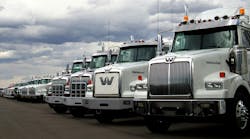Back in 2015, I made 10 predictions for 2016. I’ve never looked at myself as much of a prognosticator, so I decided to revisit those predictions to see how well I did and then take a look at what will change for 2017.
10. The Federal Motor Carrier Safety Administration will recognize the flaws in the SMS methodology, so CSA scores will no longer be viewable by the public.
Right. Done and they changed the scoring criteria as well, so I should count this as two!
9. The EPA will acknowledge that the bar is set too low for SmartWay-approved new truck tires, so it will set more stringent criteria for the designation.
Wrong. Not even close on this one; SmartWay approval appears to be easier than ever.
8. The intermodal industry finally realizes that tube-type tires on multipiece rims are not worth the risk.
Progressing. We’re getting there. The rail and steamship lines are starting to replace 30-year-old multipiece components with single-piece rims and bias ply tires with radial tires.
7. Drivers get fed up with roadside flat tires and start using air gauges to check the inflation pressure during every pretrip inspection.
Progressing. I don’t know what I was thinking, but the ROI on tire pressure monitoring systems (TPMS) is looking better, so it has the potential to improve and make driver negligence less costly.
6. Wheel refinishers develop a set of standards that they use to create a premium designation.
Wrong. Maybe the industry just forgot about this one?
5. Fleets agree to a national torque check program where drivers can get fasteners checked for the proper torque after wheel service at one of thousands of authorized torque check centers.
Progressing. Nothing official, but more service providers than ever before are properly torqueing wheels, so progress is progress in my book.
4. Research to develop alternatives to natural rubber makes a major breakthrough, and the stress on the global supply is eliminated.
Progressing. This was a very aggressive goal, and we are still a long way from independence on the cartel in Southeast Asia, but research is continuing and there is hope that alternative resources can be utilized to meet the global demand for natural rubber.
3. Tire companies take the savings from lower natural rubber prices and finally agree to include an RFID tag on every truck tire.
Progressing. I don’t know if rubber prices have anything to do with it, but electronic identification is on the market and will hopefully expand.
2. The trucking industry unites to implement a plan for TPMS that will make most of the nation’s fleet compliant by 2020.
Progressing. It doesn’t look like the feds can make the cost-benefit analysis work for mandating TPMS on commercial motor vehicles, which means fleets will have to decide for themselves if TPMS is worth the investment.
1. Fleets recognize that truck tire and wheel service should be left to the professionals who are properly trained to follow industry guidelines and procedures.
Progressing. We still have a long way to go on this one, but the good news is that more fleets that perform their own tire service are investing in employee training.
For those of you keeping score, that’s one definite win (CSA), two definite losses (SmartWay and Wheel Refinishing), and seven works in progress. Since 9 of the 10 predictions are still in play, I’ll leave them in place for the next 12 months and hope there is measurable progress in these areas. Of course, this means I’m one short for 2017, so the new prediction is:
10. The new administration follows through on the campaign promise to invest in our nation’s infrastructure, and the condition of highways and Interstates starts to improve.
Here’s hoping I can look back on this list in a couple of years and get more than just one right.


